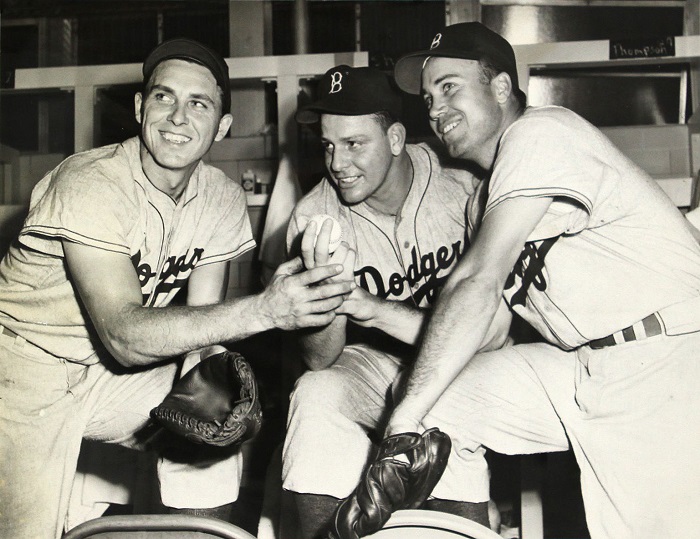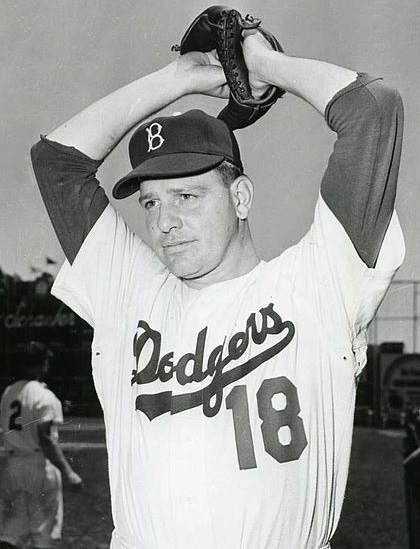They say you never forget your first love. At least that’s what I’ve been told. As much affection as I have always had, and still do, for the Los Angeles Dodgers, there is no doubt my first love was the Brooklyn Dodgers. Perhaps it was that I fell in love with them in my pre-teen formative years. Perhaps it was that they were close enough to my home in Nova Scotia that I could listen to the radio broadcasts of Dodger games and that golden voice we still cherish today. Perhaps it was simply that I made up a score sheet for each game and completed it as instructed by my little league baseball coach trying to will certain things to happen that would influence the outcome of the game. You know – willing Duke to hit a home run, Pee Wee to steal a base, the Reading Rifle to gun down a runner at third base or home plate or for Oisk to rack up one more strikeout.
In any event, many memories out of Brooklyn are etched on my mind and in my heart. Growing up I was shielded from those things that often steer youngsters astray because I had a wonderful family and was raised in a small town atmosphere. However, I have always felt strongly that the Brooklyn Dodgers also played a part in helping me avoid some of life’s enticements that are better left alone. I was so wrapped up in every game during the baseball season that there was no time to get into trouble. Little else mattered.
I must also confess that during the winter Gordie Howe and the Detroit Red Wings filled the void for me when there was no baseball, although hockey has always played a distant second fiddle to baseball.
I often think back to those days and my memories of players that played with the “Boys of Summer.” Many baseball fans, perhaps most, have heard of the big names that played with the Dodgers in the 1950’s, as a number of them went on to play with the Dodgers after they moved to Los Angeles following the 1957 season. Additionally, no less than eight members of 1950’s Brooklyn Dodgers have been inducted into the Baseball Hall of Fame in Cooperstown, New York: Roy Campanella, Don Drysdale, Sandy Koufax, Pee Wee Reese, Jackie Robinson, Duke Snider, Tommy Lasorda and Walter Alston.
As with all successful teams, there are role players whose baseball feats often go unnoticed among the heroics of the all-star players. Their contributions are essential for any team if it is to compete at a level high enough to boost the team into postseason play. In fact, it is often the seemingly no-name players that emerge as the most valuable players in World Series competition.
Many of the lesser lights on the Brooklyn Dodgers come to mind when I reminisce about what I consider to be the golden age of baseball. Among those players that I can clearly recall Vin summoning in from the bullpen was a big right-handed pitcher who had a brief but notable career with the Dodgers.
Born in the Chicago on March 21, 1923, right-hander Jim Hughes made his debut with the Brooklyn Dodgers in September 13, 1952 – the same year Sandy Amoros and Joe Black made their Dodgers debuts. Hughes was 29 at the time and was coming off two successful seasons with the Dodgers AAA affiliate in Montreal. With the Royals he won 10 games in 1951, pitching both as a starter and in a relief role while posting a 3.69 ERA.

Jim Hughes (center) with Dodger greats Gil Hodges (left) and Duke Snider.
(AP photo)
During the 1952 season with the Royals, Hughes pitched strictly in relief making 45 appearances over 95 innings and winning nine games while posting a 2.86 ERA. He earned a September call-up to the Dodgers winning two games while losing one and posting a 1.45 ERA over 18 innings in seven appearances.
Hughes enjoyed a successful season in 1953 winning four games and losing three. He made 48 relief appearances over 85.2 innings and finished the season with a very respectable 3.47 ERA.
He made one World Series appearance in 1953 against the New York Yankees in game one of the series. He picked up Carl Erskine, who had an unexpectedly poor outing giving up four runs in the first inning. Hughes pitched four strong innings giving up one run while striking out three. In the top of the sixth inning the Dodgers drew within one run of the Yankees. They subsequently lost the game 9-5 giving up three runs in the ninth inning. That was to be the only World Series appearance for Hughes during his seven-year MLB career.
Jim Hughes’ 1954 season was a trend-setting one for the Dodgers and perhaps all of baseball. He won eight games, lost 4 while pitching 86.2 innings. He posted an ERA of 3.22. His 60 appearances led all of major league baseball as did his 24 saves. Saves at that time were less often a ninth inning appearance as is the case for today’s closers. It more likely meant a longer appearance and at a different stage in the game, usually with runners on base. Stranding inherited runners was the key to success – both then and now.
His saves total in 1954 eclipsed Hugh Casey’s Brooklyn franchise record of 18, recorded seven years earlier in 1947. Although it was matched in 1970 by Jim Brewer, pitching for the Los Angeles Dodgers, it was not exceeded until Jay Howell recorded 28 saves in 1989. Jim Hughes’ record for saves in a Dodger uniform lasted 35 years. His record of 24 saves will always be the Brooklyn Dodger record.

Long before the term “closer” was fashionable, Jim Hughes was one of the best in Dodgers franchise history. (AP Photo)
Following his record setting season in 1954, Hughes appeared in 24 games in 1955 pitching only 42.2 innings. Fellow reliever Clem Labine appeared in 60 games for the Dodgers in 1955 pitching 144 innings, thus replacing Hughes as the Dodgers’ number one go-to guy out of the bullpen.
In his last full season in MLB in 1956, Hughes pitched only 12 innings with the Dodgers before being traded to the Chicago Cub. At age 33 he made 25 appearances with the Cubs during the season while posting a 5.16 ERA.
Jim Hughes’ career came quickly to a close in 1957 after only five innings with the Chicago White Sox. He finished his career with only one start in 172 career appearances with a career mark of 15-13 and 39 saves.
While many Dodger pitchers, along with most pitchers, were torched by Stan Musial, Hughes limited “the Man” to just three hits in 22 plate appearances for a .188 batting average. Perhaps that is not all that unusual as relievers were often called “firefighters” or “firemen” in those days and were often called upon to cool off smoking bats. However, the right-hander Hughes successfully cooled off Musial’s left-handed bat. That in itself was unusual.
It seems there is never a Dodgers story without our beloved Tommy Lasorda being a part of it. At one point in his career Hughes roomed with Lasorda, who himself had a brief stint with the Dodgers in 1954 and 1955.
“He was a big, tough guy,” recalled Lasorda of Jim Hughes. ”It would take him three, four pitches to get warm. After a few pitches, he was fogging it. Nothing but hard stuff. Didn’t have a breaking ball.”
A few years after his baseball career ended, Hughes followed the tradition set by his father, grandfather and numerous other family members – who were Chicago firefighters. He too joined the Chicago Fire Department and served with the department from 1963-1986.
After beginning his career as a firefighter, Hughes could not resist playing on what was obvious, at least to him, when one day he visited with former Brooklyn Dodgers manager Walter Alston, who was sometimes known as “Smokey.” Hughes donned a Dodgers jersey for a photo with Alston but was not satisfied with just that. As his son Michael recalled: “He had a fire helmet on his head, he carried an ax and he had a hose over his shoulder.”
Jim Hughes died in Crestwood, a suburb of Chicago, at the age of 78 on August 18, 2001.




 January 2nd, 2016 at 6:00 am
January 2nd, 2016 at 6:00 am  by Harold Uhlman
by Harold Uhlman  Posted in
Posted in 

Thanks Harold, for recalling Jim Hughes for us oldtimers.
It is sad, although not all that surprising, that many below-the-radar players from the past are often lost (or not even known) by many of today’s Dodger fans – but alas, such is life.
Like yourself and many of us “veteran” Dodger fans (aka: old farts), I love reading about the rich history of baseball’s most-storied franchise. I also love the photo of Gil, Jim and Duke – great find!
Thanks for sharing this great piece, Harold.
BTW: During my youth and adolescence, Ron Perranoski and Jim Brewer were two of my favorite Dodger “firemen.”
I came across this while searching my grandpa’s name. I love that there are people who remember him and still talk about his baseball AND fireman career. Seeing a current article about him made me smile. Thank you!
Thank you for the response. I listened to games when your grandfather pitched. I used to wait for him or Clem Labine to come in when the starters got into some trouble.
Glad you enjoyed the article.
Very cool.